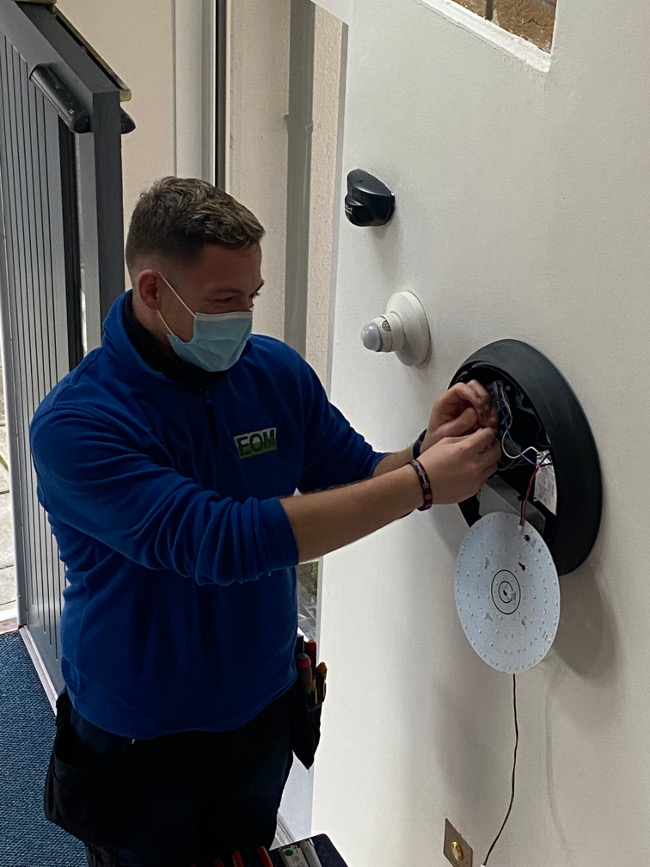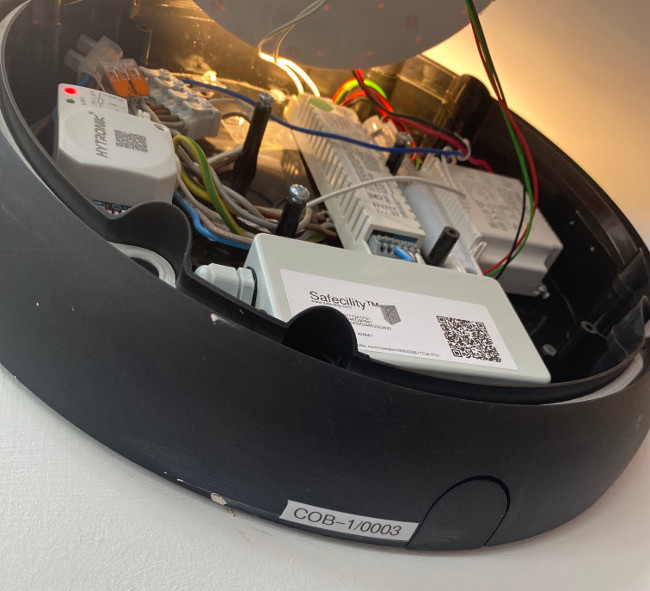Young Irish business Safecility has developed automatic wireless technology for large property companies to test and monitor emergency lighting and life safety systems and reduce costs by as much as 90%.
Safecility’s products help councils and housing associations across Ireland and UK streamline their fire safety workload as they face steeper compliance challenges. For example, new building safety legislation passed by Westminster is expected to generate at least £1.2bn in additional spending by these groups on fire safety by 2025.
Dun Laoghaire-based Safecility has just been shortlisted for two prestigious awards: Most Innovative New Product and Best Fire Safety Innovation at the prestigious Housing Digital Awards which take place in February 2022.
“Every school, hospital, shopping centre, apartment block, office block, factory and warehouse must have emergency lighting that must be tested every single month”
The business was earlier this year awarded funding by DIGIFED to continue developing innovative technology for smarter, safer buildings. As part of the award, the company will collaborate closely with STMicroelectronics to speed up development and time to market of its new Safesound project.
This brings the total in European innovation funding awarded to the business to over €160,000 since 2018. Safecility – the only Irish company among the 16 recipients – was awarded €42,000 by the consortium toward development of Safesound. The Safesound project will develop smart electronics using edge-processing techniques to identify emergency events within buildings and support the work of emergency response teams, fire and safety managers and sustain the goal of safer buildings and communities.
Shining a light
“Emergency Lighting is a life safety system that’s sometimes overlooked in terms of importance,” said founder and CEO Cian O’Flaherty. “But just like fire alarms and fire extinguishers, it’s a crucial part of fire safety and is legally required in most categories of buildings.
“Without emergency lighting building occupants are suddenly plunged into darkness during a power cut; this can cause confusion and panic and in the worst-case scenario even put a stop to safe evacuation of the building.
“Emergency lighting legally has to be installed in every building except for single family homes. But installing these lights is just the beginning, from then on, all lights must be tested at a minimum monthly and repairs undertaken if testing fails.
“Every school, hospital, shopping centre, apartment block, office block, factory and warehouse must have emergency lighting that must be tested every single month. In the vast majority of cases this testing is carried out manually by a technician or electrician. It’s hugely inefficient and massively expensive, especially for large scale building owners like social landlords and housing associations. An average hospital or factory could have 1,000 lights to be tested. A housing authority or council could have 10,000 in their estate,” O’Flaherty explained.
Building automation

“95% of the buildings we’ll live and work in by 2050 are already built. Retrofit solutions that are quick and easy to install are key to ensuring these buildings are not left behind when it comes to smart buildings and automation”
Safecility designs and build sensors that take over the job of manual compliance inspection of Emergency Lighting in buildings and instead replace it with complete automation.
“Even with the best of intention, manual testing can lead to human error. For systems that are as critical as emergency lighting this can lead to disaster. Automation eradicates human error involved in testing emergency lighting, vastly improves safety and cuts costs.
“95% of the buildings we’ll live and work in by 2050 are already built. Retrofit solutions that are quick and easy to install are key to ensuring these buildings are not left behind when it comes to smart buildings and automation. That’s why we’ve developed wireless sensors that operate without local internet access or the need for any additional wiring. Our sensors are open and interoperable and are installed in less than 10 minutes. They let building managers test their emergency lighting systems, automatically generate testing records, and view their compliance reports all without having to leave their desk,” O’Flaherty said.
Buildings of things

Cian O’Flaherty founded Safecility in 2017 and is a solo-founder. Safecility grew out of his experiences in the building industry and seeing that technology was moving toward converged, connected equipment capable of delivering services to customers.
He noticed how people were spending large sums on installing equipment and then signing major service contracts for maintenance and testing of that equipment.
He reasoned that with so much emerging technology in IoT (Internet of Things) it was surely possible to begin automating this work and creating extensive savings and opportunities for building owners and technology companies.
“We are lucky to be based in Dublin at the IADT in Dun Laoghaire and went through the New Frontiers programme there originally, it has been a fantastic support to us starting up. The ecosystem around the city has a really supportive vibe for start-ups and founders and pre-Covid it was possible to regularly meet each other and learn from other peoples’ experiences.
“Ireland is a small market for most start-ups, so we all share the space of trying to fine tune a product for international deals as soon as possible in order to survive. This can be a great benefit as companies that survive have a robust source of sales and lots of international experience to share.
“However, it can be quite challenging to start-ups that need more runway and time to grow. Investment rounds here can be smaller than elsewhere and it can be tough to make those maths work. It is always possible to find and connect with others who have experience to share with you which is quite a good reflection of the level of cooperation among founders here.”
O’Flaherty explained that Safecility closed a seed round earlier this year with Enterprise Ireland and private investors.
“Our growth trajectory has taken off since then and we are looking at potentially raising growth funding in the next 12 months to ensure we can keep up with demand.”
The entrepreneurial road for O’Flaherty has been an instructive one so far. “I know we hate clichés but often they are clichés because they are true. In our case ‘everything takes twice as long as costs twice as much’ has been the biggest lesson. No matter what you think you are doing to speed up the process, it will still take twice as long.
“We began in 2017 exploring solutions to deliver real automation to our customers. This was turned into a technically complex journey, compounded by Covid-19 delays across all of 2020. Founders who tend to view a lot of hurdles through rose tinted glasses should make their peace with this and stay calm about the jobs to be done. And given the length of time it will take, your early team will be crucial to keeping the show on the road. Without people smarter and better than you, you will really struggle to reach the launchpad.”
His advice to fellow founders is to keep showing up. “90% of any success is showing up. In so many cases, I have seen projects fold because the key people just stopped turning up – mentally or physically. It is very easy to get deflated and disillusioned, it is normal given the kind of risks we take to start our companies. But the best investment we make in their coming good and turning into revenue generating businesses is continuing to ‘turn up’.
“Whether its deals that take way too long to close or a tech problem that just won’t resolve, turning up and staying committed to an outcome is such a crucial ingredient. This is emotionally draining for founders and senior team members so keep an eye on how people are doing and make sure they are taking care of themselves and have enough in the tank for a marathon not a sprint.”






